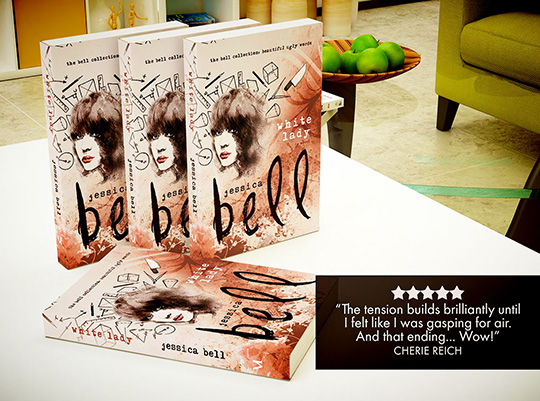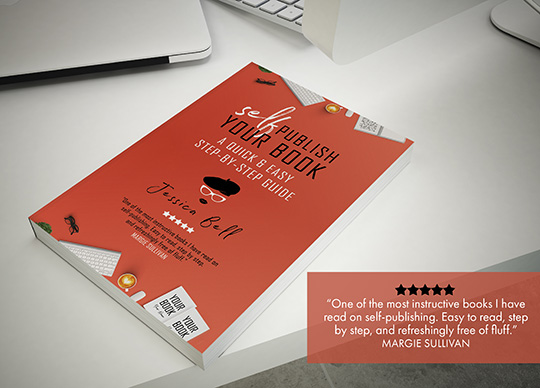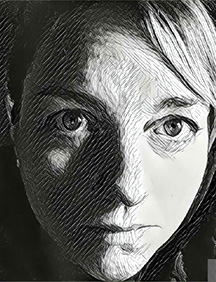
eing successful in indie or self-publishing isn’t as simple as printing words on a page. In our interview with Jessica Bell, she explains the importance of being an “authorpreneur” and the need for both good writing and good business practices. Not only is she prolific in her creative pursuits, but she exemplifies the word hustle.
Jessica is an award-winning author/poet, writing/publishing coach, graphic designer, and singer-songwriter who was born in Melbourne, Australia. In addition to having published a memoir, four novels, three poetry collections, and her bestselling Writing in a Nutshell series, she’s been featured in a variety of publications and ABC Radio National shows, such as Writer’s Digest, Publisher’s Weekly, The Guardian, Life Matters, and Poetica. She is also the publisher of Vine Leaves Press, CEO of Indie Publishing Assistance, a voice-over actor, and the coordinator of the Writing Day Workshops. In October 2016, she became the new lead singer of the well-known dream-pop group, Keep Shelly In Athens, and records and performs as a solo artist under the name BRUNO. You can find more information about her other projects at iamjessicabell.com.

WOW: Jessica, thank you for taking time out of your busy schedule to discuss the rapidly growing world of both indie and self-publishing with our readers. You have such a dynamic and creative set of roles that you play: songwriter, lead singer, author, graphic designer, voice-over actor, and publisher. Can you tell us a little bit about yourself as a writer? When and why did you start writing? Did you begin with music and move into other genres or vice versa? How did you take the jump to write your first book?
Jessica: Thank you for having me! I have a slogan on the covers of all my novels, poetry, and my memoir, that says “beautiful ugly words.” I think that pretty much sums up my writing style.
Having grown up surrounded by musicians, I started songwriting first, when I was about twelve/thirteen, which soon evolved into a love of writing poetry. Through school, I dabbled in short story writing; and eventually, in my early twenties, I wrote my first (very terrible) novel. I erased every word of it from existence. As my background was in lyrics and poetry, my storytelling skills were lacking, as I would too often concentrate on the cadence of my words without giving enough importance to plot, pacing, and flow. Now having completed the second draft of my fifth novel, and having also published a memoir in 2017, telling an engaging and gripping story seems to have taken priority.
WOW: Your slogan, “beautiful ugly words,” is fantastic. And congratulations on completing the second draft of your fifth novel! That’s amazing. Why did you decide to take the path of self-publishing? What difference do you think it made for you as an author?
Jessica: Actually, my first novel was published in 2011 by a publishing company that no longer exists (Luckly Press). When they liquidated, I decided that I couldn’t handle going through the submission process again, so I bit the bullet. I’ve never looked back. It has given me strength, confidence, and business skills I would have acquired through formal training. Being thrown into the deep end to sustain a dream is the best work experience anyone can ever get.
WOW: You’ve not only used the knowledge you gained for yourself but have written books to help authors polish their craft with your Nutshell series. One is called Self-Publish Your Book: A Quick & Easy Step-By-Step Guide. You say that it can walk people through the process of self-publishing in as little as a week. Can you share a nibble of the advice with our readers?
Jessica: This book is for authors who have never done it before. It allows them to get their feet wet without committing too much time or money to the process. And then, if they find they want to continue self-publishing after that first book, they have a great basis of knowledge in order to explore the more elaborate and detailed aspects of being an authorpreneur. Basically, this book gives authors the nuts and bolts to get a book on the market without being overwhelmed and stressed by the jungle of knowledge out there on the subject. The main idea is to produce a quality product to sell. If you don’t have that quality product, then everything else you do is useless. There is also an updated 2019 edition coming very soon!

WOW: We’ll keep our eyes open for the new edition. For authors who are interested in self-publishing, you have your company Indie Publishing Assistance (IPA). What services could writers access through IPA? What are some of the benefits of reaching out and paying for support as opposed to trying to do everything on their own?
Jessica: We have a huge range of book production, writing, and coaching services.
Book Production
- Project Management
- Development Editing
- Cover Design
- Copy editing
- Typesetting
- eBook Formatting
- Proofreading
- Marketing Materials Design
- Printer/Distributor Accounts Set-Up
- Book Trailer & Video Ad Production
- Website Creation
- Manuscript Evaluation
- One-On-One Consultation
- Puff Quote Solicitation
- Audiobook creation
- Book Translation
Writing & Coaching Services
Writing:
- Ghost Writing
- Rewriting & Restructuring
- Blurb Writing
- Copywriting
Coaching:
- Writing
- Editing
- Publishing
- Marketing
- Public Speaking
- Platform Building
By hiring a team of experienced and successful publishing professionals, a book is going to have the best chance of survival in today’s saturated market. With a professionally-produced, quality product, a book will not only hold its own alongside its traditionally published competitors, but it will be the first real steppingstone into launching a career as an independent author, sustaining a business, and gaining the trust of readers.
“It’s all about hitting the right algorithms. Lots of luck is involved in making it big as a writer. What works for one book doesn’t work for another, and vice versa.”
WOW: Not trying to do everything on your own is excellent advice. On the flip side, Vine Leaves Press (VLP) is your indie-publishing arm. Why might an author look to a smaller indie publisher as opposed to a larger, more traditional publishing house? Why do you find your authors choose VLP to you as opposed to other options?
Jessica: I find that a lot of authors who submit to VLP are either huge supporters of indie businesses or have books they feel aren’t commercial enough for the Big 5. Or a combination of both. Small presses, in general, tend to take more risks. Yes, they’re businesses that need to make money, but they are also huge advocates of art and are, therefore, open to more experimental works.
WOW: VLP has a submission process with step-by-step instructions for authors. What are some of your biggest pet peeves when it comes to submissions? What floats your boat and makes you want to work with that author?
Jessica: Biggest pet peeves:
Addressing me as “Dear Sir.”
Realizing we’re the recipient of a mass mail-out due to the author mistakenly hitting CC instead of BCC. (Personalize it, people!)
When authors assume that because we are independent, we are automatically going to accept their books, and they begin their queries with a long list of demands.
What floats my boat:
When an author understands the great need for a presence on social media nowadays, presents us with social media links in the bio, and doesn’t expect a publishing contract to be a one-sided business deal. The more authors can do to market their books, the more we are able to do to match their efforts.
When an author is familiar with some titles in our catalogue and shows a genuine interest in being published by us. An author who submits to us in the hopes to snag the first “yes” is not a good attitude to have (and believe me, I can tell when this is the case!). The authors at VLP become a really close-knit family of supporters (we have a private Facebook group where everyone is able to interact), so we want people who not only want their books published by us, but want to support VLP as a business and the other authors published by VLP, too.
WOW: Some key pieces that jump out are attention to detail, do your research, and understand this is a business. I love that VLP’s authors have a support network for each other as well. What hints can you share with our readers about getting ready to submit? What can they do to give that extra wow factor?
Jessica: Basically understand who they are submitting to. They should share a love of books, not of getting published.
The understanding that they need to have a website and social media profiles.
To put it bluntly, if you don’t, you won’t sell books. For example, the hardest type of book to sell, and one that is targeted towards a very niche audience, is a vignette collection. An author of ours with a collection out who has no online presence has sold a total of two copies in two years. An author of ours with a collection out who has a moderate online presence has sold more than 200 copies in two years. An author of ours with a collection out who has a well-established online presence has sold more than 500 copies in two years.
If you want to be a Vine Leaves Press author, the following are compulsory:
a) Author website
b) Mailing list
c) Facebook profile
d) Twitter profile
e) Instagram profile
And these are optional extras that will make our eyes sparkle:
f) Goodreads
g) YouTube
h) Pinterest
i) Tumblr
j) Reddit
k) LinkedIn
Social media is important no matter how you are published. If you don’t have any books to your name, it doesn’t mean you have no reason to be online. Be yourself. Be a personality people want to talk to and interact with. Make online friends. They will end up being your best supporters.
WOW: As writers, we need readers. Building a social media following and an audience is important, so you have people ready to buy. Speaking of getting books in hands, why do you use both print and digital publication? Have you found one more effective at reaching readers? Do you see any trends with one or the other?
Jessica: I find that both sell equally well nowadays. Just like different genres reach different audiences, print and digital formats reach different kinds of readers. It’s a matter of personal taste, and I don’t believe that print is ever going to disappear. In fact, for some of our titles, we sell more copies in print than in eBook. I believe this is because some readers like to binge read, and others like to savor. And generally, those who like to savor, prefer print because they want physical evidence of something they have enjoyed.
WOW: That would make a great quiz: do you savor or binge your reading? Once VLP accepts a book, what are the next steps? Do you assist with editing, cover art, layout, printing, etc.?
Jessica: Yes, we do everything. All this information can be found on our FAQ page.
WOW: Are there any warnings, dangers, or bad situations writers should be aware of before they take the steps into indie or self-publishing?
Jessica: Don’t fall for false hopes. If a company claims to be able to make you a bestseller, run. No one can ever know if that is going to happen. It’s all about hitting the right algorithms. Lots of luck is involved in making it big as a writer. What works for one book doesn’t work for another, and vice versa. The key is to love what you do and persevere until something takes off and hits the mark.
WOW: Jessica, thank you again for spending this time with our readers. I know I learned a lot about the business and self-promotion side of being a writer. What we all want is for other people to read our words, and you’ve offered great advice on how to get books, either paper or digital, into the hands of readers.
***

Christy O’Callaghan lives in Upstate New York. She works with incarcerated adults seeking employment. Her favorite pastimes include hiking, gardening, swimming, and collecting sea glass—anything outside in the fresh air. You can learn more about her, her blog about being an over 40 newbie writer, and her work at www.christyflutterby.com.